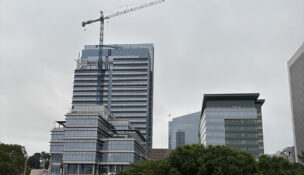Solar-powered Flying Squirrels stadium on way
CarMax Park to have pro baseball's largest solar array
Beth JoJack //August 5, 2025//

Dominion Energy plans to install more than 1,700 solar panels on CarMax Park’s two-tiered roof, in addition to five solar-covered carports in an adjacent parking lot. Rendering courtesy Dominion Energy

Dominion Energy plans to install more than 1,700 solar panels on CarMax Park’s two-tiered roof, in addition to five solar-covered carports in an adjacent parking lot. Rendering courtesy Dominion Energy
Solar-powered Flying Squirrels stadium on way
CarMax Park to have pro baseball's largest solar array
Beth JoJack //August 5, 2025//
SUMMARY
- Dominion Energy to install over 1,700 solar panels at new stadium
- Five solar-covered carports will also be installed in an adjacent parking lot
- Installation will generate about one megawatt of electricity
- Project will be the largest solar setup in pro baseball, pending approval
The Richmond Flying Squirrels will definitely be bringing the heat soon, as the Minor League Baseball team’s new stadium will have professional baseball’s largest solar panel array, subject to local and state approval.
Dominion Energy Virginia announced Tuesday it plans to install a solar array on the roof and parking lot of CarMax Park, the future home of the Richmond Flying Squirrels, the city’s Double-A team. The park is slated to open in spring 2026, but the installation of more than 1,700 solar panels will take place after the season.
The solar array will generate about 1 megawatt of electricity or enough to power 250 Richmond homes at peak output, according to the Richmond-based Fortune 500 utility.
“This project isn’t just about what happens inside the ballpark; it’s about stepping up as a community partner and using our platform to help bring clean energy to the city,” Lou DiBella, managing partner of the Flying Squirrels, said in a statement.
Dominion Energy’s Virginia solar fleet is the third largest in the nation, producing enough electricity to run more than 750,000 homes at peak output.
“We’re thrilled that such an iconic Richmond landmark will help deliver reliable, affordable and increasingly clean power for our customers,” said Ed Baine, Dominion Energy’s executive vice president of utility operations and president of Dominion Energy Virginia.
CarMax Park is under construction next to the city’s 41-year-old Diamond, the Squirrels’ home since 2010. After years of discussion, the city, team and developers finalized plans for the $2.44 billion, 67-acre Diamond District development, which is centered around the $117 million, 8,000-seat baseball stadium. A hotel with at least 180 rooms, 891 residential units and 30,000 square feet of commercial space are also on tap.
Dominion’s plans
Meanwhile, Dominion received baseline approval for its 2024 Integrated Resource Plan on July 15, as the Virginia State Corporation Commission called the document “legally sufficient.” Submitted in October 2024, the plan calls for more offshore wind and solar energy development, as well as small modular nuclear reactors starting in the mid-2030s.
Natural gas is still in play too, representing about 20% of all power generation for the next 15 years, even though the state’s Virginia Clean Economy Act enacted in 2020 requires 100% carbon-free sources for electricity generation by 2045. The current IRP, which is not binding but is supposed to indicate the utility’s direction for the next two years, received criticism from environmentalists.
“Dominion’s 2024 IRP effectively ignored the carbon-neutral requirements of the VCEA,” Peter Anderson, director of state energy policy for environment nonprofit Appalachian Voices, said in a statement to Virginia Business on Tuesday. “Any planning model that takes into account the VCEA’s 2045 carbon-free deadline — which was only 21 years away when Dominion published its IRP — would make significantly different investment decisions.”
While accepting the document, the SCC instructed Dominion to include at least one model that complies with VCEA regulations for future IRPs. However, under the Trump administration, solar and wind power is in disfavor, and many state political experts say that the VCEA’s rules may need to be adjusted to allow natural gas to remain part of the mix longer, especially with new data centers and AI use growing exponentially.
n

















